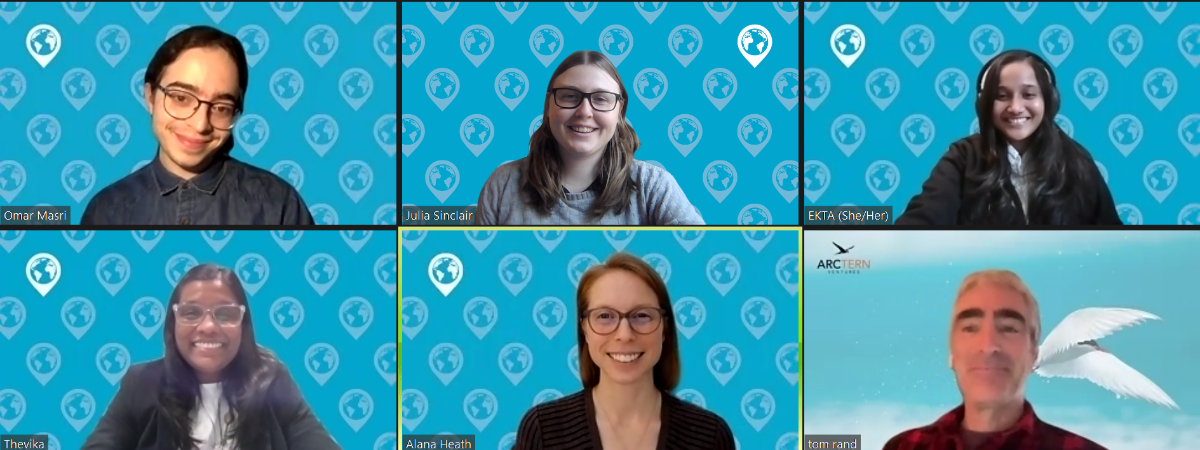Ted Rogers School students take on global sustainability challenges over Reading Week

A group of Ted Rogers School students participated in a learning experience called “How to Change the World | February 2023 Bootcamp (external link) ” designed to help change the world and won several awards.
The How to Change the World program saw two cohorts from Canada and Germany supported by local sustainability experts, stakeholders and a teaching team. The program took place February 20-24, was held virtually and "focused on positively impacting the complex sustainability challenges faced by communities around the world."
As part of How to Change the World, students are assembled into small, highly-diverse, multi-disciplinary teams within larger cohorts, focusing on a challenge based on the UN's 17 Sustainable Development Goals (external link) , which include climate action, clean water and sanitation, affordable and clean energy, gender equality and sustainable cities and communities among others.
Students explored Sustainable Development Goal 13 (external link) , which urges action to combat climate change and its impacts. They focused on Scarborough and brainstormed ideas for solutions, transformed their ideas into proposals, engaged with experts and partner organizations. Finally, they presented their ideas to the judging panel, who identified the best overall, the most creative and implementable ideas.
Five students from Ted Rogers School were sponsored by the Ted Rogers Students’ Society (TRSS), including Omar Masri, Safia Mohamud, Jagroop Johal, Marisol Rivera, Faaizha Bakhtiar.
“When we heard about the opportunity, the TRSS Board of Directors was thrilled to fund the initiative as we thought it would be a great way for students to apply the skills they’ve learned to real world challenges,” said Chantal Wong, TRSS president.
Fourth-year Global Management Studies student Omar Masri said the experience was intensive but empowering. He found the meaningful conversations with his teammates, the teaching team and the experts valuable. His team of four drew members from Victoria, Calgary and London, and each came from a different academic background. One was pursuing a PhD.
Masri’s team looked at Collingwood Park in Scarborough and noticed that Highland Creek passes through it. He said his team found studies that suggested the creek water contained E. coli bacteria, phosphorus, and other contaminants. Their solution was to implement rainwater gardens in the park (external link) .
“The water that passes through these rain gardens will be filtered and cleaned as it goes to the Highland Creek watershed and out to Lake Ontario,” he said. “The park is very small and the impact could be very small, but we believe if that small effort was rolled out to other watersheds in the area, that could actually create a pretty big impact.”
Jagroop Johal, a fourth-year business management student at the Ted Rogers School also took part in the learning experience over Reading Week.
“When we were coming up with a solution, their perspectives were really interesting to hear,” she said. “As a business student, I'm very focused on strategy and implementing it and my team members were a lot more focused on the technical side, on the feasibility. So that was really eye-opening and a great experience just for me to have as well.”
Johal’s team’s challenge was also centred on climate action around Scarborough. She said they wanted to raise awareness and, “remind people that every action you take has a direct impact on climate change and you have the power to change that.”
“Our solution focused on ensuring that climate action is feasible for everyone, especially people in low income neighbourhoods,” she said. “We thought of an idea that would show carbon footprint displays to each mode of transportation (external link) on virtual map applications… Just by adding that feature, I feel like people would be more conscious of the actual impact they're having on the environment, whether they choose to walk, take transit or take their personal vehicle.”
Masri’s team won Best Overall solution for his cohort, Johal’s team won the Participant’s Choice award, and second year business management student Faaizha Bakhtiar’s team won Most Creative award.
It was rewarding for Johal to apply the skills she learned in her Ted Rogers School courses like GMS 724 and BUS 800 to the program and get a better understanding of sustainable development goals, she explained.
“I learned that the sustainable development goals, they're worldwide problems, they can't just be solved with a one-and-done kind of solution,” she said. “They will constantly need to be managed.”
Masri said his experience was challenging but a wonderful learning opportunity.
“From a business perspective, I got a better sense of how complicated this world is and how complex it can be,” Masri said. “But, if you start from a community level, there's so much that can be accomplished. The smaller you start, the more you’re able to measure results, strategize and evaluate for future potential.”
How to Change the World reported that nearly 90 per cent of the participants across their February and March cohorts would recommend the program to friends and colleagues. For more information about How to Change the World programs, see how-to-change-the-world.org (external link, opens in new window)
